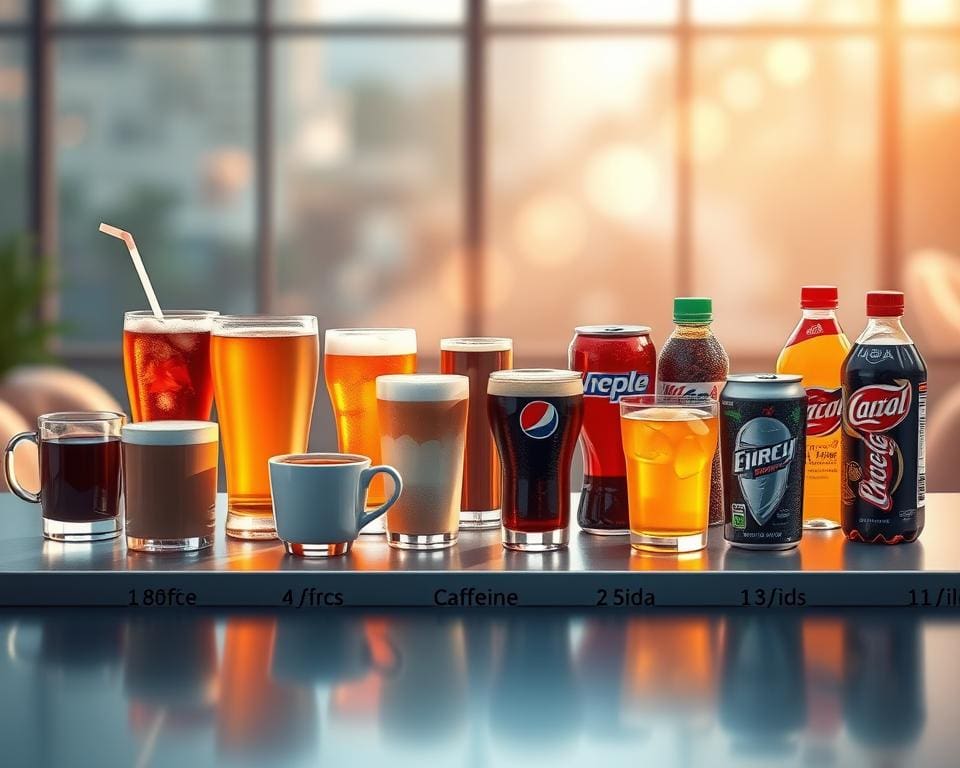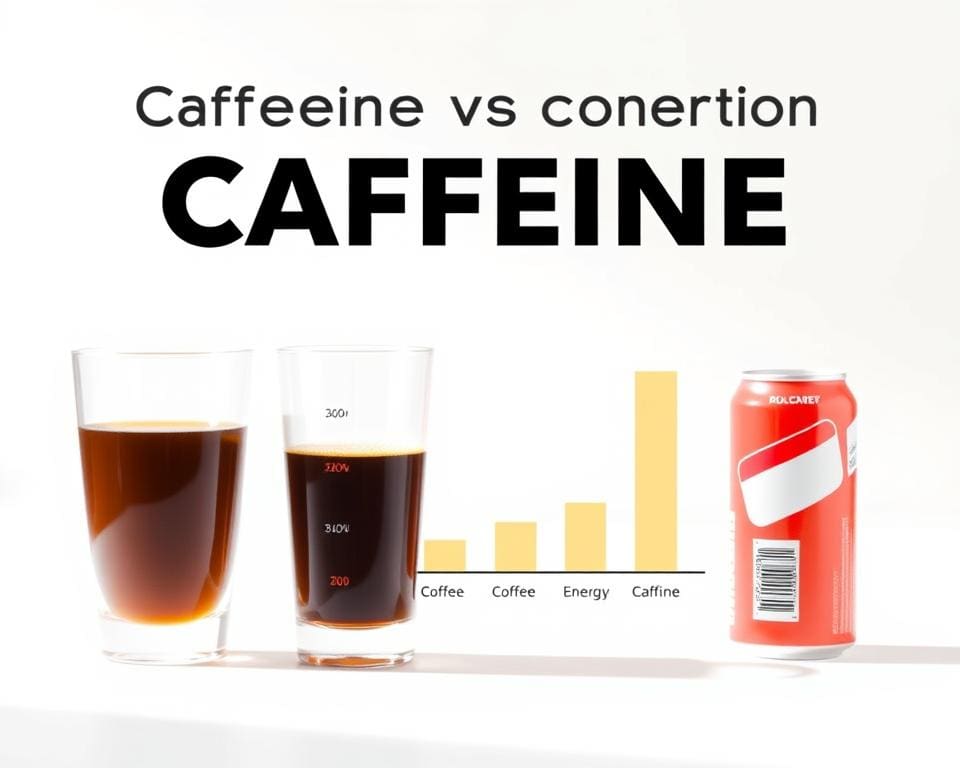The debate surrounding caffeine content comparison between coffee and energy drinks has generated considerable interest in recent years. While coffee has long been celebrated as a staple source of caffeine for many, energy drinks are rapidly gaining traction, particularly among younger individuals. This shift in consumption patterns calls for an examination of what contains more caffeine: coffee or energy drinks? As we delve deeper into the caffeine levels in popular drinks and their health implications, it is essential to equip ourselves with knowledge that enables informed decisions regarding our caffeine intake.
Understanding Caffeine: What You Need to Know
Caffeine is a naturally occurring stimulant found in various beverages that has captured the attention of many due to its effects on the body. Understanding the science behind caffeine is essential for making informed choices about caffeine consumption. The exploration of this compound reveals not only its chemical nature but also how it influences energy levels and performance.
The Science of Caffeine
Caffeine acts primarily by blocking the action of adenosine, a neurotransmitter that promotes sleep and relaxation. This blockage leads to increased activity of other neurotransmitters, such as dopamine and norepinephrine, elevating alertness and energy levels. The caffeine levels in popular drinks vary significantly, underscoring the importance of knowing how different beverages might impact your focus and productivity. For example, a standard cup of coffee might contain about 95 mg of caffeine, while energy drinks can range from 50 to 300 mg per serving depending on the brand and formulation.
How Caffeine Affects Your Body
The effects of caffeine extend beyond mere alertness. When consumed, this stimulant can lead to increased heart rates and enhanced metabolic processes. Understanding these systemic effects is crucial, especially when considering the potential for dependency associated with regular consumption of caffeinated products. Many people compare caffeine in energy drinks and coffee to assess which beverage offers the most benefits without the downsides. While coffee brings with it a wealth of antioxidants and a sense of tradition, energy drinks often come loaded with various additives that might alter how the body absorbs and reacts to caffeine.

What Contains More Caffeine Coffee Or Energy Drinks
The debate surrounding energy drinks vs coffee caffeine intensifies as consumers weigh their choices. Understanding the caffeine levels in popular drinks provides valuable insights into making informed decisions. This section dives into specific caffeine content while exploring the ingredients that differentiate these beverages.
Caffeine Levels in Popular Drinks
In terms of caffeine content comparison, coffee tends to have a stable reputation, with an average cup of brewed coffee containing approximately 95 mg of caffeine per 8 oz. Popular coffee options include:
- Espresso: Roughly 63 mg for a single shot
- Filter Coffee: Similar to standard brewed coffee
- Cappuccino: Typically contains about 70 mg
When examining energy drinks, the caffeine levels can vary significantly. For instance:
- Red Bull: Contains about 80 mg per 250 ml can
- Monster: Offers between 160 – 200 mg per 500 ml can
- Starbucks’ bottled drinks: Range around 90 to 150 mg depending on the type
Certain energy drinks may even contain higher caffeine levels, particularly in larger formats, creating a compelling narrative in the energy drinks vs coffee caffeine discussion.
A Deeper Look at Energy Drinks and Their Ingredients
Aside from caffeine, energy drinks often feature a mix of additional ingredients that claim to enhance energy and performance. These include:
- Taurine: An amino acid that plays a role in several bodily functions
- B Vitamins: Essential for energy metabolism
- Ginseng: A herb reputed to boost energy levels
These components contribute to the overall appeal of energy drinks, making them enticing for those seeking a quick boost. Both energy drinks and coffee deliver caffeine, yet the highest caffeine drinks perform differently, further complicating the caffeine content comparison. The variations in caffeine levels and additional ingredients highlight the diverse nature of these two popular beverage choices.
Caffeine Content Comparison: Coffee vs Energy Drinks
The quest to discover the ideal caffeine source often leads people to question the difference between coffee and energy drinks. Understanding the caffeine levels in popular drinks provides valuable insight for making informed choices. By examining the average caffeine content in coffee and the variations in energy drinks, one can find out which has most caffeine coffee or energy drinks.
Average Caffeine Content in Coffee
An 8 oz cup of brewed coffee typically contains between 95 to 200 mg of caffeine. Factors such as the brewing method and coffee bean variety influence this range. Espresso, for instance, has a higher concentration per ounce but is often consumed in smaller servings, leading to varied perceptions about its potency.
Typical Caffeine Levels in Energy Drinks
Energy drinks present a broader spectrum of caffeine levels, often exceeding 300 mg in larger servings. Many popular brands vary significantly in their formulations, with extras like sugars and flavour enhancers. Such factors can alter the body’s response to the caffeine intake, adding another layer to the comparison of caffeine levels in popular drinks.
The Effects of Coffee and Energy Drinks on Performance
The impact of coffee and energy drinks on performance is a vital topic in understanding how these caffeinated beverages influence daily productivity. Individuals often turn to these drinks for a quick boost, yet the effects can differ significantly between the two. This discussion will explore how caffeine affects your body and the varying outcomes associated with coffee consumption versus energy drink intake.
How Coffee Boosts Your Productivity
Coffee has long been renowned for its ability to elevate alertness and cognitive function. Studies indicate that caffeine enhances memory and focus, making it an excellent choice for those needing to excel at work or study. As part of a caffeinated beverages comparison, coffee typically provides a gradual release of energy, allowing individuals to maintain productivity levels over an extended period. The familiar aroma and warm comfort of a cup of coffee can also create an inviting atmosphere, fostering a better working environment.
Energy Drinks: What Are They Really Doing for You?
Energy drinks present a different story, often lauded for their immediate energy boost due to higher caffeine content. Users may feel a surge of energy almost instantly, making these drinks appealing in demanding situations. Nonetheless, the effects tend to diminish quickly, leading to a potential crash that can leave users feeling fatigued. Many of these drinks contain additional ingredients such as sugar and taurine that can complicate their effects on the body. Users should consider the caffeine content comparison between energy drinks and coffee, weighing the short-term effects against the potential long-term drawbacks.
Making the Right Choice: Which is Best for You?
As you consider your caffeine consumption, it’s essential to reflect on what aligns with your lifestyle and health goals. When making the right choice between coffee and energy drinks, assessing their individual benefits can guide your decision. Moderate coffee consumption is associated with numerous health advantages, including its rich antioxidant properties that contribute to overall well-being.
On the other hand, energy drinks, though they offer an instant boost, often contain high sugar levels and may lead to addiction. Understanding the implications of these factors is crucial when determining which is best for you. Are you looking for a drink that enhances productivity sustainably, or are you drawn to the instant energy boost that energy drinks provide?
Ultimately, the choice between energy drinks vs coffee caffeine should be informed by personal preferences, lifestyle, and any existing health conditions. By cultivating a mindful approach to your caffeine choices, you can ensure that your decision not only satisfies your immediate needs but also supports your long-term health. Reflect on your habits and embrace a caffeine source that truly resonates with you.









